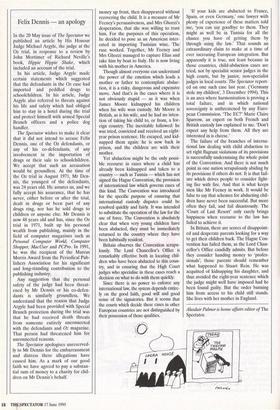THE COURT OF LAST RESORT
Child abductors are professionals, writes
Alasdair Palmer, and the number of
their clients is growing
WHEN Stuart Rein lost his battle for cus- tody of his daughter, he was devastated. He could not accept the judge's ruling that his child should remain with the woman he hated. His access rights were withdrawn when he refused to comply with a court order to hand over his daughter's Ameri- can passport. When that happened, Mr Rein did what many losers in a court battle fantasise about doing: he gave up on the law, and resorted to force.
Mr Rein paid £12,000 to a French team of private detectives. Together, they exe- cuted a well-planned operation to help him capture his four-year-old daughter, Lindsay. It succeeded. When Mrs Rein emerged from her home in South London, four men wearing sunglasses surrounded her. Mrs Rein says one of them sprayed an aerosol into her face whilst Mr Rein snatched their child. (Mr Rein denies that anyone used aerosol.) Neighbours heard the infant cry, 'I don't want to go with you. I want to be with my mummy.' Her mother screamed, 'My baby, my baby!' Mr Rein and the French private investigators were unmoved by those cries. They drove Lind- say through the night to Scotland, then took a ferry to Ireland. From there, Mr Rein flew, with Lindsay, to New York, before the two took off for Israel.
Mr Rein is an American citizen. His wife is English. Abduction happens most fre- quently in cases of international marriage, where the parent who is given custody either moves to, or stays in, a country where the parent denied it is unwilling or unable to live. There are agencies which specialise in using force to get children back. The quaintly named Corporate Training Unlimited, based in Fayetteville, North Carolina, is one of them. It is run by Mr Don Feeney and his wife, Judy. Mr Feeney is an ex-Delta Force officer addict- ed to risk but with a soft spot for people unjustly deprived of contact with their off- spring.
He calls his organisation 'the Court of Last Resort'. He has rescued children from Tunisia, Jordan, Bangladesh and Ecuador. But Mr Feeney knows as well as anyone that abduction does not always work out as planned. His most famous operation ended in disaster.
That was when he was hired by James Grayson, an American, to get his daughter back from Iceland, where Grayson's estranged ex-wife, Erna Eyjolfsdottir, had taken their child. Mr Grayson was asked for an initial payment of $35,000. Two of Feeney's operatives then turned up on Mrs Eyjolfsdottir's doorstep in Reykjavik. They announced that they were locations scouts working on a new movie starring Sylvester Stallone and Kim Bassinger. The film was going to be shot in Iceland. And Mrs Eyjolfsdottir's house was a perfect location for the main love scene between Sly and Kim. Amazingly, Mrs Eyjolfsdottir believed it all. She even travelled to Zurich to meet 'Mario Casare', the world famous director who was going to head the project. `Mario Casare' was, in fact, Don Feeney. The only problem with the Zurich trip was that Mrs Eyjolfsdottir decided, at the last moment, not to bring her child. 'Mario Casare' was forced to put in an unsched- uled trip to Iceland as a result. He man- aged to lure Mrs Eyjolfsdottir and her daughter Anna Nicola out of her home and into Reykjavik's poshest hotel on the pre- text of a meeting with Sly and Kim. He then gave her what he said was aspirin but turned out to be a sleeping draft. When she woke up, her child was gone.
She called the police instantly. 'Mario Casare' was still struggling with Anna Nicole at Iceland's International Airport. He was arrested as he was about to board a plane to New York. 'Mario Casare' admit- ted to being Don Feeney before being con- victed of kidnapping and sentenced to two years' imprisonment.
Corporate Training Unlimited almost failed to recover from that blow. But two weeks after he was released from an Ice- landic prison, Mr Feeney was at it again. This time, the target was Elias Ghozzi, the four-year-old son of Mrs Connie Ghozzi, whose husband had abducted him to Tunisia. Mrs Ghozzi had already paid out over $100,000 to men who had promised to get her son back: they had all taken the
Felix Dennis — an apology
In the 20 May issue of The Spectator we published an article by His Honour Judge Michael Argyle, the judge at the Oz trial, in response to a review by John Mortimer of Richard Neville's book, Hippie Hippie Shake, which included an account of the trial.
In his article, Judge Argyle made certain statements which suggested that the defendants in the Oz case had imported and peddled drugs to schoolchildren. In his article, Judge Argyle also referred to threats against his life and safety which had obliged him to stay in a hotel during the trial and protect himself with armed Special Branch officers and a police dog handler.
The Spectator wishes to make it clear that it did not intend to accuse Felix Dennis, one of the Oz defendants, or any of his co-defendants, of any involvement in the importation of drugs or their sale to schoolchildren.
We accept that such an accusation would be groundless. At the time of the Oz trial in August 1971, Mr Den- nis, the youngest of the defendants, was 24 years old. He assures us, and we fully accept his assurance, that he has never, either before or after the trial, dealt in drugs or been part of any drugs ring, nor has he sold drugs to children or anyone else. Mr Dennis is now 48 years old and has, since the Oz trial in 1971, built up his personal wealth from publishing, mainly in the field of computer magazines such as Personal Computer World, Computer Shopper, MacUser and PCPro. In 1991, he was the recipient of the Marcus Morris Award from the Periodical Pub- lishers Association for his significant and long-standing contribution to the publishing industry.
Any suggestion that the personal safety of the judge had been threat- ened by Mr Dennis or his co-defen- dants is similarly groundless. We understand that the reason that Judge Argyle had been provided with Special Branch protection during the trial was that he had received death threats from someone entirely unconnected with the defendants and Oz magazine. That person had threatened him for unconnected reasons.
The Spectator apologises unreserved- ly to Mr Dennis for the embarrassment and distress these allegations have caused him. As a mark of our good faith we have agreed to pay a substan- tial sum of money to a charity for chil- dren on Mr Dennis's behalf. money up front, then disappeared without recovering the child. It is a measure of Mr Feeney's persuasiveness, and Mrs Ghozzi's desperation, that she was willing to trust him. For the purposes of this operation, he decided to pose as an American inter- ested in importing Tunisian wine. The ruse worked. Together, Mr Feeney and Mrs Ghozzi managed to capture Elias and take him by boat to Italy. He is now living with his mother in America.
Though almost everyone can understand the power of the emotion which leads a mother or father to contemplate abduc- tion, it is a risky, dangerous and expensive move. And that's in the cases where it is not obviously stupid — as it was when James Moore kidnapped his children when his wife won custody. Mr Moore is British, as is his wife, and he had no inten- tion of taking his child to, or from, a for- eign country. The inevitable followed: he was tried, convicted and received an eight- year prison sentence. He escaped, and kid- napped them again: he is now back in prison, and the children are with their mother.
Yet abduction might be the only possi- ble recourse in cases where a child has already been kidnapped and taken to a country — such as Tunisia — which has not signed the Hague Convention, the provision of international law which governs cases of this kind. The Convention was introduced for the specific purpose of ensuring that international custody disputes could be resolved quickly and fairly. It was intended to substitute the operation of the law for the use of force. The Convention is absolutely clear that when very young children have been abducted, they must be immediately returned to the country where they have been habitually resident.
Britain observes the Convention scrupu- lously. The Lord Chancellor's Office is remarkably effective both in locating chil- dren who have been abducted to this coun- try, and in ensuring that the High Court judges who specialise in these cases reach a decision on what to do with them quickly.
Since there is no power to enforce any international law, the system depends entire- ly on the good faith, good will and good sense of the signatories. But it seems that the courts which decide these cases in other European countries are not distinguished by their possession of those qualities. `If your kids are abducted to France, Spain, or even Germany,' one lawyer with plenty of experience of these matters told me, 'you can say goodbye to them. They might as well be in Tunisia for all the chance you have of getting them by through using the law.' That sounds an extraordinary claim to make at a time of ever increasing European integration. But apparently it is true, not least because in those countries, child-abduction cases are tried, not by specialist senior judges in the high courts, but by junior, non-specialist judges in local courts. The Spectator report- ed on one such case last year. (`Germany stole my children', 3 December 1994). This is an area where harmonisation is proving a total failure, and in which national sovereignty is unthreatened by any Euro- pean Commission. The EC?' Marie Claire Sparrow, an expert on both French and British custody law explained to me. 'Don't expect any help from them. All they are interested in is cheese.'
The failure of the branches of interna- tional law dealing with child abduction to set right flagrant violations of its provisions is successfully undermining the whole point of the Convention. And there is not much point in one nation scrupulously abiding by its provisions if others do not. It is that fail- ure which drives people to consider fight- ing fire with fire. And that is what keeps men like Mr Feeney in work. It would be false to say that schemes for abducting chil- dren have never been successful. But more often they fail, and fail disastrously. The `Court of Last Resort' only rarely brings happiness when recourse to the law has failed to achieve it.
In Britain, there are scores of disappoint- ed and desperate parents looking for a way to get their children back. The Hague Con- vention has failed them, as the Lord Chan- cellor's Office candidly admits. But before they consider handing money to 'profes- sionals', those parents should remember what happened to Stuart Rein. He was acquitted of kidnapping his daughter, and thus avoided the eight-year sentence which the judge might well have imposed had he been found guilty. But the order banning him from access to his child still stands. She lives with her mother in England.
Alasdair Palmer is home affairs editor of The Spectator.



































































 Previous page
Previous page